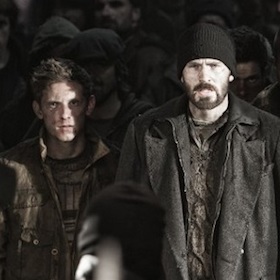‘Snowpiercer’ Review: Chris Evans Shows Range In Inventive Dystopian Drama

4.5/5
Snowpiercer, starring Chris Evans as the reluctant leader of a rebellion, imagines a post apocalyptic dystopian future that – despite some glaring impossibilities – could be the smartest and most thought provoking that the popular genre has provided as of yet.
Directed by Joon-ho Bong, in his first English-language effort, Snowpiercer tells a “modern day” Noah’s arc story with a massive train serving as humanity’s only chance to survive an apocalypse. In an effort to stave off the global warming crisis, the world takes experimental action that reverses the effects and then some, bringing about the coming of an ice age that would wipe out the planet. Thankfully, an engineer by the name of Wilfred (Ed Harris) prepared for such an event, building a train with a built-in ecosystem to save the human race. Those who boarded Snowpiercer were the only ones to survive.
Aboard Snowpiercer are two disparate classes. The elite nosh on steak and sushi, while the ragged men, women and children in the train’s version of steerage subsist on gelatinous protein bars made of reconstituted bugs – which we find out only became available after cannibalism threatened the population, particularly that of the babies. Four years away from the last revolt, the relegated are ready to once again vie for control of their train car world. As the mantra goes, “Control the engine, control the world.”
Curtis (Evans), mentored by the one-armed sage of the lowest class, Gilliam (John Hurt), becomes both the face and the muscle of the revolution. Though he claims not to be a leader, Gilliam and Curtis’ slight but spirited sidekick Edgar (Jamie Bell) know better; people will follow him. The question becomes not if Curtis will lead them, but when, and how – and how effectually. Tension and excitement build simultaneously, making the uprising seem less a contrived bit of movie making, but a genuine, human inevitability.
As Wilfred remains hidden, tending to the engine at the front of Snowpiercer, Mason (Tilda Swinton) serves as his mouthpiece – the spokesperson for the conductor, and therefore for the state. Mason thrusts her power upon the weak in a way that is every bit as insane as it is menacing. There’s a sense of instability about her that goes along with her sternness, displayed by her two finger point and matter of fact “so it is” linguistic filler.
Swinton’s performance as Mason provides Snowpiercer with a laughable villain, someone whose indoctrination is complete, unknowingly making her every utterance a farce. She speaks of order through her oversized teeth, peering out at the impoverished with unmasked disgust and little pity through thick-lensed glasses, issuing absurd punishments that do nothing but fuel the rage of the lowest, but biggest, class.
Evans’ Curtis provides the perfect foil for Mason – unassuming, meek, uncertain and insecure, and yet more capable than she’ll ever be. While they both might be operating on faith in someone surer than themselves, Curtis is pragmatic and determined; Mason is brainwashed and fey. They both are, however, ruthless in their resolve to protect their notions. Without the red, white and blue Captain America getup, Evans proves himself capable of taking on grittier parts with a more complicated morality and greater depth.
When an opportune moment strikes, Curtis leads the downtrodden on the mission to commandeer the engine. Along the way, they come upon windows that give a glimpse of the snow-covered world they left behind, club cars filled with the drug addled, tailors that could’ve mended their torn garments, dentists that could’ve fixed their rotting mouths, cafes that could’ve fed them. The world that literally lies ahead of them was rife with luxury while they lived in unimaginable destitution. It’s so impressive that, for a moment, it’s tempting to forget the rebellion, preferring to ogle the intricate and immaculate rail biome, admiring its creation.
With the help of one of Snowpiercer’s designers, Namgoong Minsoo (Kang-ho Song), and his teenage daughter Yona (Ah-sung Ko) – both of whom are junkies on resident drug Kronol – the impoverished trudge forth through the train cars, battling the elite and their well-equipped army. Deaths are abundant, lessons learned. A spry and vengeful teacher (Allison Pill) feeds Wilfred’s propaganda to the youth of the elite. The parents of those children, though ignorant of the worst parts of their world, prove eager to protect their status. Knives are wielded, gunshots are fired. Hope is ephemeral.
Snowpiercer, like films of its kind that have come before it, has a mysterious leader. There’s a privileged class and there’s the subjugated. An unlikely and reluctant hero is born. An ensemble of characters form around him, trusting him to lead them to victory against their oppressors. They have a spirit-building mantra. Yet, packed within the confines of a train that charges, year after year, on tracks that span the iced-over world, Snowpiercer feels inventive – combining the possible and implausible, the ruthlessly bleak with uncomfortably black humor.
Snowpiercer manages to feel fresh and raw in what has fast become a cinematic wasteland of post-apocalyptic flicks with dystopian cultures more depressing and psychologically draining than the next. The idea of the world as we know it collapsing and rising from the ashes as a fascist state doesn’t guarantee the same shock it once did. Somehow, despite the threat of boring audiences tired of the same tropes, Snowpiercer eclipses them with a greater level of depth and intelligence that make its even less plausible moments digestible. Although there isn’t a drop of sunshine in Snowpiercer, its dusky vision fascinates and engages by shining a different light on what could be – but which most will rest assured believing will never be.
RELATED ARTICLES
Get the most-revealing celebrity conversations with the uInterview podcast!








Leave a comment